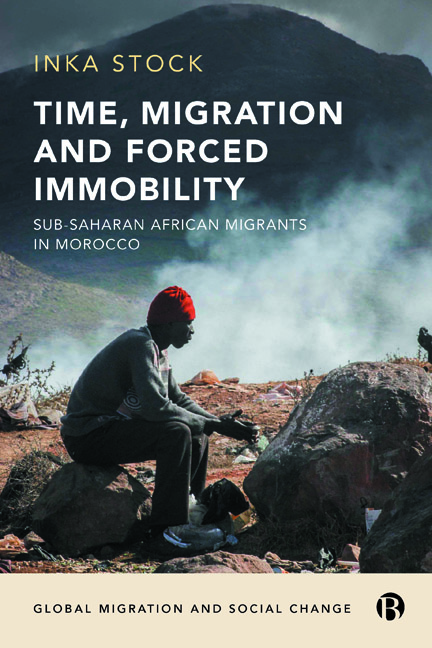Book contents
- Frontmatter
- Global Migration And Social Change
- Contents
- List of Figures and Tables
- Acknowledgements
- Series Preface
- 1 Introduction
- 2 EU Externalization Policies and their Impact on Migrants in Morocco
- 3 Travelling Adventures: Migration as an Existential Quest
- 4 Arriving in Morocco: Becoming Trapped in a Context of Uncertainty
- 5 Facing Time and the Absurd
- 6 Migrant Communities in Morocco
- 7 Waiting in Desperate Hope
- 8 Conclusion
- Bibliography
- Index
6 - Migrant Communities in Morocco
Published online by Cambridge University Press: 30 April 2022
- Frontmatter
- Global Migration And Social Change
- Contents
- List of Figures and Tables
- Acknowledgements
- Series Preface
- 1 Introduction
- 2 EU Externalization Policies and their Impact on Migrants in Morocco
- 3 Travelling Adventures: Migration as an Existential Quest
- 4 Arriving in Morocco: Becoming Trapped in a Context of Uncertainty
- 5 Facing Time and the Absurd
- 6 Migrant Communities in Morocco
- 7 Waiting in Desperate Hope
- 8 Conclusion
- Bibliography
- Index
Summary
Introduction
In the previous chapter, I indicated how migrants lose their sense of belonging and identity through their altered relation to time. In this chapter, I want to focus on migrants’ interaction with community structures in Morocco, in order to demonstrate how forced immobility also alters their relationship to place. The data presented here shows that migrants’ social relations in forced immobility are on the one hand a site for recovering identity and social significance, but on the other hand also position some of them in relationships of dependence and exploitation. These contradictory relationships to ‘place making’ are at the root of migrants’ desire to keep on moving, and also inhibit them from becoming ‘rooted’ transnationally. This insight questions the usefulness of describing migrant community structures in ‘transit’ either negatively as exploitative trafficking networks (Crisp 1999) or overly positively as social capital (Evergeti & Zontini 2006). Instead, I argue that a deeper look at migrant community relations in forced immobility helps us to appreciate the complicated nature of reciprocity, solidarity and mutual dependence among the migrant community in Morocco and the weight these factors have in informing migrants’ self-worth and personhood. Such an analysis could have important repercussions for changing priorities in community projects with migrants in Morocco.
My initial interest in this subject was not to study migrant communities per se, but to look at how individual migrants experienced life in immobility. Despite this, during fieldwork it became obvious to me that migrants’ relations with other migrants constituted an important aspect of their daily lives and shaped their experience of forced immobility and their own personhood. I decided to include an analysis of migrants’ community relations here in order to demonstrate the link between the individual's way of conceiving their life and how they are perceived and evaluated by other migrants. This tension enables one to appreciate that migrant communities are important factors in mitigating how migrants deal with prolonged situations of uncertainty through strategies of active waiting and hopeful anticipations of the future (Brun 2015).
- Type
- Chapter
- Information
- Time, Migration and Forced ImmobilitySub-Saharan African Migrants in Morocco, pp. 107 - 128Publisher: Bristol University PressPrint publication year: 2019



